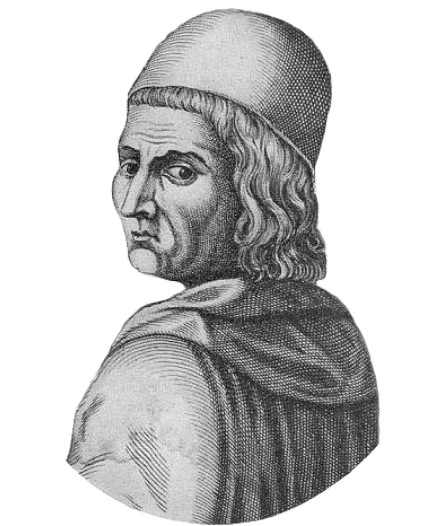Memorial for Marcilio Ficino
In Memory of Marsilio Ficino (1433-1499): Renaissance Philosopher and Reviver of Platonic Thought
Marsilio Ficino, a towering figure of the Italian Renaissance, dedicated his life to the revival of Platonic philosophy, leaving an indelible mark on the intellectual landscape of the time. As a scholar, translator, and philosopher, Ficino's translation of Plato's complete works into Latin made these seminal texts accessible to a Western audience for the first time, sparking a profound resurgence of interest in ancient wisdom.
His leadership of the Platonic Academy in Florence, under the patronage of the Medici family, became a hub for humanist scholars and thinkers, where discussions on the soul, virtue, and the nature of reality flourished. Ficino's synthesis of Platonism with Christian thought, particularly in his influential work Theologia Platonica, provided a bridge between ancient philosophy and the spiritual concerns of his era, deeply influencing European philosophy for centuries.
Ficino’s devotion to the contemplative life and his belief in the power of love and beauty as pathways to the divine remain lasting contributions to Western thought. His legacy endures in the continued study of Platonism and the Renaissance tradition, as his efforts helped to lay the foundation for modern philosophical and metaphysical inquiry.
Prayer for Marcilio Ficino
O Marcilio Ficino, reviver of Platonic light,
In the corridors of wisdom, your vision took flight.
Rekindler of the Academy's sacred flame,
Guide us in the pursuit of Platonic acclaim.
Ficino, scholar and sage of noble mind,
In the Platonic tradition, your spirit we find.
As the Academy's doors swung open wide,
May your influence in our hearts abide.
In the gardens of knowledge where ideas bloom,
Ficino, in your teachings, our minds consume.
Through the dialogues of ancient Greece,
May the Platonic ideals never cease.
O Ficino, whose pen revived the classics,
In the Renaissance, you lit the cosmic wicks.
Guide us through the realms of timeless thought,
In the Platonic wisdom, forever sought.
As the Academy echoed with scholarly hymns,
Ficino, in your honor, our gratitude brims.
May your legacy endure through time,
In the pursuit of truth, sublime.
O reviver of the Platonic flame,
Ficino, in your honor, we acclaim.
Guide us in the quest for wisdom's light,
In the Platonic Academy's sacred sight.
Daily Prayer
Supreme, paternal deity, omnipotent and just,
Source of all goodness, in thy divine mind we trust.
Inheritors of virtue, bestowed by heavenly kin,
Mortal and prone to fault, yet capable of mend again.
Through the crucible of mortality, our errors find correction,
Guided by thy offspring, architects of redemption.
Grant liberation from the sorrows of our missteps,
Through thy progeny, be our journey gently swept.
Approaching the blameless, possessing virtuous intent,
May we, in thy likeness, with noble minds be sent.
Thou, gentle and benevolent, lead us on the path refined,
Father divine, in thy kindness, our souls aligned.
Daily Meditation
"You will bend your efforts to insinuate into yourself this spirit of the world above all, for by this as an intermediary you will gain certain natural benefits not only from the world's body but from its soul, and even from the stars and the daemons. For this spirit is an intermediary between the body of the world and its soul; and the stars and daemons exist in it and by means of it.”
—Marcilio Ficino
3 books on Life; 3.IV
Marcilio Ficino, though Christian, had a profound and deep understanding and appreciation for Platonic Philosophy and theology. He argued for the Prisca Theologia to be a new way forward for the Western world, incorporating Orpheus, Plato, Hermes Trismigestus, and other ancient writers alongside Christian sources like Moses. Had the West accepted Ficino’s ideas at the time, we could already be living in a world graced again with philosophers and sages as spiritual guides. In time, Ficino will be appreciated as a genius who was far ahead of his time as one who bridged the divide between Christian and Classical ideas.
Monthly Ascesis: Breath and the Pneuma
“In the Western classical tradition, the words for spirit and soul - pneuma, psyche, anima, and spiritus hold profound significance. Interestingly, each of these words also carries the meaning of breath or to breathe. This linguistic connection underscores the belief that breath is the essence of life. In the myth of Prometheus, for instance, it was Minerva’s breath that animated the clay figures of man, giving them life.”
The breath is one of our most powerful tools for spiritual practice and is directly linked to our souls. When we speed up our breathing, our mind speeds up. When we slow it down, our mind slows. Controlling our breath is a leap forward for control of the self and our passions.
“Once you have fixed your breath, you can start to focus on it and use it as an instrument to still the mind. With each breath, there will be a slight pause at the top of the breath and a slight pause at the end of each exhalation. To increase stillness, we will let our minds come to rest in the pause following the exhalation. Breathe out and rest in that moment between breaths. When you feel the need to breathe in again, then do so and come back around to the rest point of the next exhalation.”
-Excerpts from, Ascesis: the Handbook of Platonic Practice
If you would like to subscribe to the Daily Romanist Devotional, please follow the instructions here.




